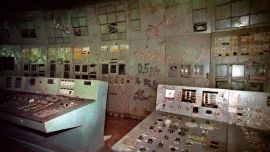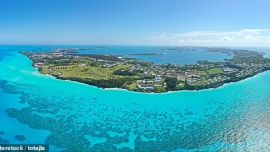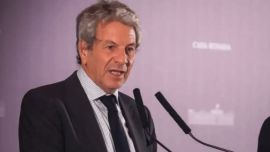In a crisp black suit with a bright blue tie, Juan Guaidó pushed and shoved his way through rows of helmet-clad national guardsmen, cursing and scolding them for blocking him from entering the National Assembly.
“You don’t get to decide who gets in!” he yelled, inching his face up close to the young man impeding h is access to Venzuela’s legislature.
In recent days, the opposition leader who drew thousands of Venezuelans to the streets last year, only to see his momentum steadily fizzle out, appears to have gotten his mojo back.
Images of the man recognised by the Grupo de Lima. United Nations. and over 50 nations in total as Venezuela’s rightful president scaling the National Assembly’s spiked iron fence, tussling with national guardsmen and taking a spirited oath, shouted into a darkened National Assembly operating without electricity, seem to have riled up his base once more.
“Today he’s the star once again,” said Luis Vicente León, president of Datanalisis, a Caracas-based polling company. But, the analyst added: “It won’t be enough. He needs to convert his potential energy into kinetic energy.”
Much is resting on the 36-year-old lawmaker’s shoulders: whether he can capitalise on the new momentum could determine if the opposition’s flagging movement reinvents itself or drifts into the sidelines of history.
Many are sceptical that Guaidó can still mobilise unrest against President Nicolás Maduro’s administration. An estimated 4.5 million people have fled the country, many of them the young adults most likely to protest. Countless others are too preoccupied trying to meet basic needs to turn out for a demonstration that might not change anything.
Guaidó will also have to rally disparate opposition factions that united to re-elect him as head of the National Assembly over whether or not to participate in this year’s legislative elections.
Thus far, the opposition hasn’t articulated a joint strategy. Many are weary of participating in a vote with Maduro still in power, pointing out that the current National Electoral Council is still stacked heavily in the president’s favour.
Others note that if they don’t run, Maduro’s government could gain control of what many see as Venezuela’s last democratic institution.
LIMELIGHT
Guaidó leaped into the international limelight nearly one year ago when he climbed up on a stage before thousands of Venezuelans to declare himself the beleaguered nation’s interim president, saying it was his constitutional right to step in because Maduro’s re-election was not legitimate.
The previously unknown backbencher, who studied at the George Washington University, was immediately recognised by US President Donald Trump and dozens of other nations stretching from Ecuador to Estonia.
He led a forceful street campaign, but a series of missteps proved costly. In February, he snuck into Colombia, defying a Supreme Court order prohibiting him from leaving the country, to oversee the entry of international humanitarian aid into Venezuela. But state security forces refused to let the goods in, staying loyal to Maduro. Then came a blundered attempt at sparking a military revolt in late April. Though a few dozen soldiers joined Guaidó and his mentor, Leopoldo López, in urging the nation’s armed forces to turn against Maduro, most stayed in their barracks. Compelled to negotiate, Guaidó and the Maduro government sat down for talks in Barbados mediated by Norway that started out promising but went nowhere. A series of corruption scandals involving purported misuse of funds for deserted soldiers and opposition lawmakers secretly doing the bidding of government allies left the opposition bruised. By December, Guaidó’s approval rating had plummeted to 38 percent, down from a high of 61 percent 10 months before, León said.
Not only had Venezuelans grown distrustful of Guaidó, they’d also steadily lost faith that Maduro’s unpopular government could be removed. Whereas in February over 70 percent stated in polls that they believed there’d be a change within three months, by December only 21 percent were optimistic, León said.
GALVANIZING
Sunday was expected to be more of the same: a showing of hands in favour of renewing Guaidó’s term in office as head of the National Assembly, with some abstention or votes against by factions who are upset with his leadership.
Instead, it turned into a galvanizing moment. Thick rows of green-uniformed guardsmen blocked Guaidó and other opposition lawmakers from entering. At one point, he tried scaling the National Assembly’s fence, only to be pulled down by the tail of his suit.
Inside, Luis Parra, a one-time ally who had been expelled by an opposition party for allegedly taking bribes to favour government associates, declared that he was the new National Assembly speaker, claiming to have garnered 81 votes of 150 lawmakers present, (a detailed tally has not been provided).
Separately, Guaidó held a session at the offices of Venezuelan newspaper El Nacional, in which the opposition says he obtained 100 votes, including from some from sceptics.
When Parra tried to hold a session Tuesday, Guaidó and a caravan of lawmaker supporters stormed past national guardsmen and forcibly entered the legislative building, sending the Maduro-backed leaders inside scrambling.
“Today, lawmakers delivered a victory for the Venezuelan people,” Guaidó declared.
But how long might it last? In some ways, little or nothing has changed: Maduro is still in power, has control of the military, and the backing of powerful institutions like the Supreme Court.
Guaidó leads a largely powerless institution with no ability to enforce its proposals.
“Once the dust is settled, he’ll continue to face the same challenges,” said Diego Moya Ocampos, a political analyst.
– TIMES/AP


























Comments